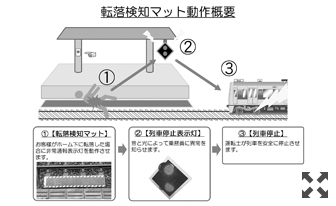Introduction to Accessibility and
People-friendly Facilities
- Accessibility Facilities
- People-friendly Facilities
Station Facilities
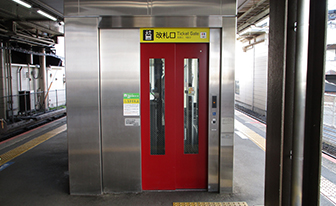
Elevators and Escalators
We have established elevators and escalators so that it is possible to move smoothly in our station premises.
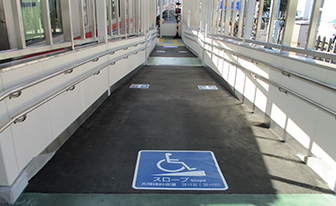
Slopes
These are passageways that reduce the need for steps on station premises.
Guidance Warning Blocks
We have installed bumpy tiles to ensure safe walking in the platforms of all our stations (69 stations). Furthermore, we are working on installing bumpy tiles with lines marking the inside of platforms. These make it possible to understand where the inside and outside of the platform is by installing linear bumps on the inner part of platforms.
Braille Ticket Machines
We have installed ticket machines with braille markings in all our stations (69 stations).
Braille Fare Tables
We display fares from the current station in braille. We have installed these in all of our stations (69 stations).
Braille Information
We have installed tactile maps of station premises. In addition, we display exits and destinations with braille guides installed on the stairway railings in station premises.
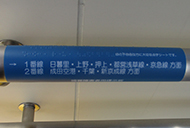
Wheelchair Lifts
We have installed lifts that can be used by manual wheelchairs to ascend and descend in two station platforms.
Voice and Audio Guide (Bells Giving Guidance to the Blind)
To ensure the safe and smooth passage of visually impaired passengers through station premises, voice and audio guides are provided near ticket gates, platform stairs and washrooms.
Train Facilities
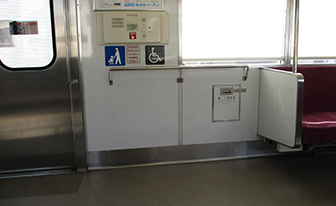
Wheelchair Spaces
We have installed wheelchair spaces in the front/end cars of commuter trains (with some exceptions) and no. 5 cars on our AE series trains.
Station Facilities
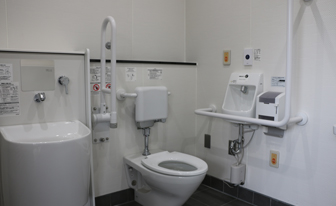
Multipurpose Restrooms
We have installed handrails in the restrooms in all our stations (69 stations). Furthermore, we are working on installing separate wheelchair compatible restrooms in 53 stations. We have also installed similar restrooms in the no. 5 cars on our AE series trains.
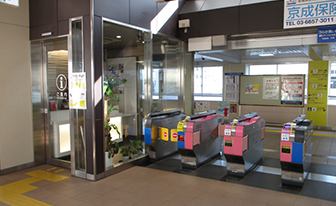
Walk-in Ticket Gate Counters
We have introduced walk-in ticket gate counters at Keisei Yawata Station, Keisei Tsudanuma Station and Keisei Narita Station. These make it possible to give guidance in a position closer to customers. We are currently working on installing these at Keisei Ueno Station.
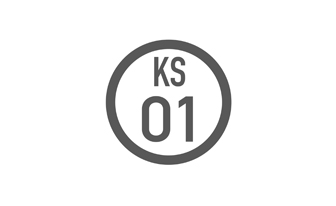
Station Numbering
We have introduced station numbering on the station names and route maps in all stations on our lines. We have taken the initials of "KS" from "KeiSei" for the numbering. In addition, we have adopted the "HS" numbering of the Hokuso Railway for the Hokuso Line segment on the Narita SKY ACCESS. We are striving to enhance our information so that customers using us for the first time and customers who are visiting Japan from overseas can take trains with us even more conveniently.
Fall Detection Mats
We have installed fall detection mats at Keisei-Takasago Station as a facility to inform nearby trains there is an abnormality when a customer has fallen onto the track from the platform. If a customer falls onto the track, the train stop signal light will flash to inform the driver of the abnormality and then safely stop the train.
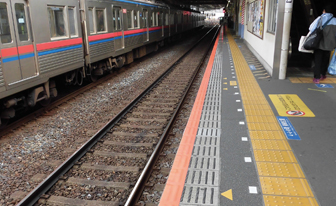
Platform Alert Sheets
We have drawn yellow lines on platforms in places where they become narrow to alert customers. In addition, we are working on installing color psychology (CP) lines to visually and psychologically alert customers that they are at the end of the platform.
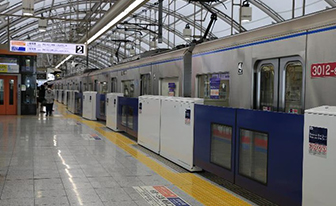
Platform Doors
We are working on installing platform doors to improve safety on platforms by preventing customers falling down from the platforms and by preventing contact with trains on the platforms.
We have started using these at the down-train (from Tokyo) platforms (tracks 1 and 2) at Nippori Station from February 2018.
Please do not lean forward or recline on the platform doors because there is a risk of contact with a train.
Please do not lean luggage or similar against the platform doors.
Please do not run to get on the train. This is extremely dangerous because it may lead to an unforeseen accident (e.g. you may become caught in doors that are closing).
Please do not forcibly enter inside the platform doors.
Automated External Defibrillators (AEDs)
AEDs are devices to save lives from sudden cardiac arrest (sudden cardiac death). In addition to installing these in all stations on our lines, we have equipped them on all our AE series formation trains. The aim of installing AEDS is to improve the life-saving rate by giving first-aid using these devices until the ambulance arrives.
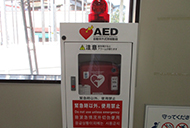
Destination Displays
We have installed destination displays in 30 stations (e.g. our main stations). These are displays that give a variety of information (e.g. departure times, train types and destinations) with LEDs. We are working on updating our old destination displays in order.
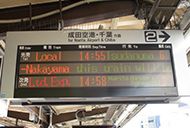
Service Information Displays
We have installed service information displays in all our stations to improve customer information services by visually displaying train service information and emergency broadcasts in the event of a large-scale disaster.
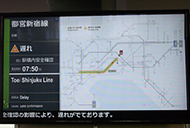
Emergency Stop Buttons
Emergency stop buttons are devices to give emergency stop notifications to trains. We have installed these in all our stations. We have developed a structure in which the train stop signal light flashes and a buzzer sounds to let the crew and station staff know that there is an abnormality and to stop the trains when one of these buttons has been pressed. We are affixing zebra display sheets to make these emergency stop buttons more noticeable.
Train Facilities
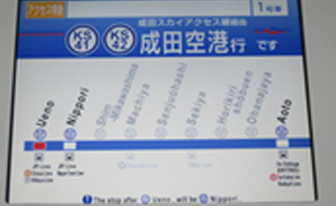
In-train Information Displays
We have installed information displays with LEDs and liquid crystal displays (LCDs) in our trains. The LCDs provide information in four languages - Japanese, English, Chinese and Korean.
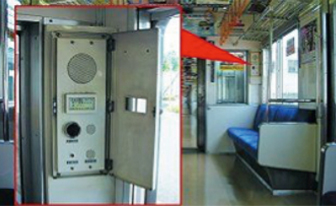
In-train Emergency Notification Devices
These are devices that let the crew know when an abnormality has arisen on the train. We have installed these in each car to make it possible to talk directly with the crew.
Priority Seating
We have installed priority seating in two places in each car on all our commuter trains. In addition, we have changed the color of the straps near the priority seating to yellow to make the position and purpose of this seating even clearer.
Inter-car Fall Prevention Canopies
We have installed canopies on the car couplings to prevent customers on the platform falling onto the railroad from the couplings of the cars (with some exceptions).
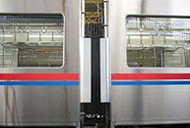
Accessibility Facilities / Station Premises List






